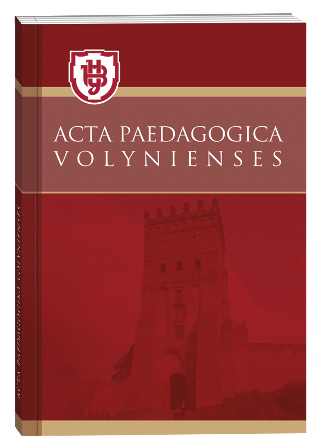FORMATION OF CONNECTED SPEECH IN CHILDREN WITH INTELLECTUAL DISABILITIES AS A SCIENTIFIC PROBLEM
DOI:
https://doi.org/10.32782/apv/2024.1.13Keywords:
Intellectual disability, individual approach, formation of coherent speech, phrasal speech.Abstract
The article theoretically substantiates the problem of forming coherent speech in children with intellectual disabilities (IP); leading concepts such as «formation of coherent speech», «phrasal speech», «individual approach» are defined. The theoretical aspect of the development of the problem of forming coherent speech of children with IP was analyzed; traditional and innovative approaches to correctional and developmental work with children with intellectual disabilities are considered; stages and methods of children's speech development are outlined. The article determined that an «individual approach» should be used for effective correctional and developmental work with children with intellectual disabilities. It was established that the individual approach is a psychological and pedagogical principle based on a unique approach to the child, taking into account his needs and opportunities to achieve results. The components for implementation and effective work with children with intellectual disabilities to improve and improve speech skills have been identified and substantiated. The causes of speech difficulties in children with IP (communicative, regulatory, cognitive) were also clarified; characterized speech of children with IP, its features. It was proved in the article that for the effective development of a child's speech, it is necessary to develop the necessary components, such as: cognitive skills, social adaptation skills, communication with peers and teachers. The main problems of the formation of speech development are revealed, and the methods and techniques proposed by scientists to eliminate the lack of a speech disorder are considered. The problem was analyzed and the importance of early intervention and the special importance of starting corrective and developmental work at preschool age were substantiated.
References
Богуш А. Мовленнєвий компонент дошкільної освіти. 4-те вид. Харків: Ранок. Навч. літ., 2013. 192 с.
Бондар Н. Методика корекційної роботи професійно-трудового навчання з розвитку зв'язного мовлення з учнями з інтелектуальними порушеннями. Корекційна педагогіка. 2023. № 2. С. 7–11.
Боряк О. Теорія і практика формування мовленнєвої діяльності розумово відсталих дітей молодшого шкільного віку: дис. … д-ра пед. наук: 13.00.03. Київ, 2019. 568с. URL: https://repository.sspu.edu.ua/server/api/core/bitstreams/4e1cc303-305c-4ae5-a861-c53a75f51866/content
Виготський Л. Мислення та мова. Харків: Майстри психології, 2021. 432с.
С. Геращенко, І. Матющенко Особливості розвитку зв’язного мовлення у дітей з інтелектуальними порушеннями. Науковий часопис. 2023. № 44. С. 24–28. URL: https://enpuir.npu.edu.ua/bitstream/handle/123456789/41786/Matiushchenko_Herashchenko.pdf?sequence=1&isAllowed=y
Кавиліна Г. Особливості мовлення дітей дошкільного віку з розумовою відсталістю. Дрогобицький педагогічний університет ім. І. Франка. 2021. №41. С. 289–293. URL: http://dspace.pdpu.edu.ua/bitstream/123456789/14683/1/Kavylina%20Ganna%20Kostyantynivna%202021.pdf
Піаже Ж. Мова та мислення дитини : підручник. Харків : Форс, 2020. 352 с.
Gesell А., Thompson Н. Психологія раннього зростання, включаючи Norms of infant behavior and method of genetic analysis. New York : Macmillan Publishers, 1938. 841 с.







